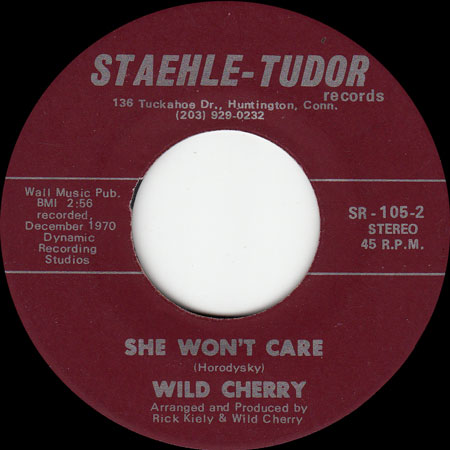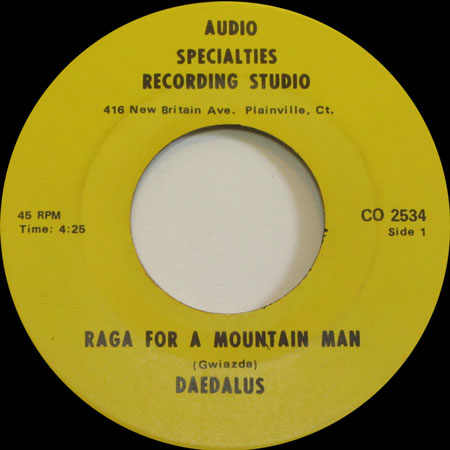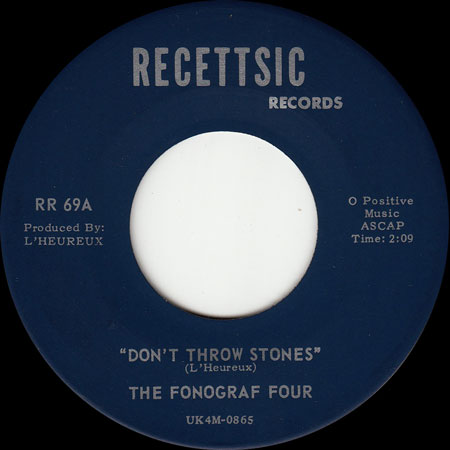 |
| Let us rejoice! From left: Dave Wright (guitar), Rick McPherson (bass), John Grabill (organ), Pete Troisi (drums). |
Gaudeamus was the sole band from the small but active Lincoln/Sudbury music scene (about 20 miles west of Boston) to cut a record. We caught up with organist/bassist John Grabill, who provided an animated and loquacious history of the band and the neighborhood scene in general. The following are John's own words verbatim — even the questions!
Gaudeamus was a second-generation super group/power trio that started in 1968 and featured Peter Troisi from one group on his giant double bass Ludwig drum kit, Dave Wright on his Rickenbacker and lead vocals, and me (John Grabill) with my Vox Jaguar playing bass and organ a la Ray Manzarek. During one notable Battle of the Bands, while all the other groups were doing quick songs like Fire and Got A Line On You, we did an 18-minute version of I Can't Keep From Crying, culminating with me standing on my reinforced Jag playing maracas and harmonica, and smashing the shakers together while jumping down on the last note.
1) Why Gaudeamus? Good question!
Prior to Dave Wright, Peter Troisi and I forming Gaudeamus, Mark Beaton and I had a group we named Rainwater Shoot, based on the sole dialogue in a Mark Trail comic strip. We changed it quickly to Rainwater. It's noteworthy that Mark was the godfather of all these many bands, with Peter and Dave being the next prolific band founders, and me rounding out the Lincoln fab four.
But I digress, as I often do. Back to the story. Dave, Peter and I were rehearsing in my living room and trying to come up with a cooler name than some of the ones our ever nascent fellow musicians had been using like Elmer Fudd, Outing Flannel, Brownstone, Mark's Maniacs and Midnight Riders.
My Dad jumped up out of his chair and started to play Brahm's Academic Festival Overture, opus 80 on our Chickering baby grand, singing out Gaudeamus Igitur. We became it!
2) Tell me about making the record, please.
Glad you asked! The idea was instigated by Dave after hearing a jingle on the radio: "Ace is the place to make recordings." He was very pumped that we make a record. Dave's grandfather, Dr. Cummings from Houston, believed in his and Gaudeamus' efforts and financed both the recording session and the pressing of the discs.
One weekend in 1969, we piled our equipment into my Mom's blue Chevy station wagon and she drove us into Herbie Yakus' Ace Recording Studio where he produced Patti Page's huge hit Old Cape Code in 1957, co-written by Milton, Herbie's brother. We hoped Herbie could work his magic on us.
First thing he wanted to do was have me put my Vox aside and instead use the studio's sweet Hammond organ... what a dream! Only... I couldn't play bass with my feet, so I embarrassingly stuck with the Jag. Oh well. It all worked out pretty well and after two or three takes, no overdubbing, our mono 45 was done! We listened in the control room and went home with acetates, ordering up the discs to be pressed. We wanted to have Produced By Herbie Yakus on the label, I mean, after all! A real producer. But he gently demured, suggesting we put Arranged by Gaudeamus instead.
We made 300 hundred copies and sold them over the couple of years we were together at dances, concerts, teen centers and the like.
3) What other groups recorded on Portafoy Records?
Well, in 1969 the pilot show of Rod Sterling's Night Gallery premiered. One segment, titled The Cemetery, starred Ossie Davis as a butler, Osmund Portifoy and his protagonist, Roddy McDowell. Peter, Dave and I caught the show and got a kick as to how whenever Osmund was needed, his employers would bark out: "Portifoy! Portifoy! Come here, I need you!" I don't know exactly how we came to choose that name for our record label, albeit spelled incorrectly, but there's the story. Now you can impress your friends with that rarely known bit of trivia.
4) What were your live shows like? Mellow like New Born Day or more pumped up like The Healer?
Yes. Besides introducing original songs into the teen scene, and making an actual record, Gaudeamus was very musically diverse. We rocked out with Born To Be Wild, Crossroads and a sweet segue going from Sympathy For the Devil and morphing right into Dear Mr. Fantasy. We could be folk-rocky with Tell Me, If I Were A Carpenter, Someone's Crying To Be Heard, and Summertime,t then charge it up with Morning Dew, I'm So Glad and I Can't Keep From Crying (originally Al Kooper/Blues Project prior to Ten Years After). A good example of our dynamics was Catch The Wind which started out Donovan-like but surged into a powerful second half. And the that's the way it was.
• • •
When Gaudeamus was armed with an actual 45, the currency of any musical dream back then, we decided to up our game and bettered our live show by adding a bass player to free me up to play multiple keyboards. Rick McPherson was a new kid in my freshman gym class; I heard he played bass and asked if he'd like to audition for the band and he shrugged. We had a rehearsal at his house, playing Let It Bleed, I'm So Glad, Can't Keep From Crying and Catch The Wind. A good musical meld and he was in.
Prior to that, the record was premiered at Stop, Look and Listen, which was a very hip and popular record shop in Concord near Concord Academy which usurped the hold the Concord Music Shop had on LP and 45 buyers at that time, located in downtown Concord. SLL was owned/run by Dan Beach, a music man on the new scene, and our record got prominent display and playing time there. Heady stuff for us! We did also get at least one on-air playing on WBCN and WNTN. Peter, who worked there part-time, managed to sell a copy to Concord Academy co-ed Caroline Kennedy. So if you're looking for your own copy, give her a call.
With Rick on board, I was able to add a clavinet sit on top of the Jag and was relieved of left-handed bass notes and could now use both hands on two disparate keyboards to greater effect.
We went beyond high school gigs and invaded anywhere we could gig: more and more teen parties, teen centers, yacht clubs on the Cape, weddings and more high school school dances. Our 45 was snapped up at all gigs quite regularly.
In 1969 my older brother recorded us doing basically a live show in my living room on a reel to real (pun intended) Teac which is really quite powerful (entitled Liquid Crap) for how young and self-taught we were. New Born Day and The Healer are included on that tape. In the summer of '70 we did another live recording (Peter had since delved heavily into becoming an excellent studio talent and producer), this time in Peter's Scituate cottage with each of us (now including Rick) in separate rooms, baffled for sound leakage, but with all of us being able to make eye contact. We did three new songs we hoped to turn into a second 45: Totally Free, a hippie dippy anthem; and a rhythmic boogie, Just Let It In by me; and a scorcher rocker with twin guitar leads by Dave and Rick, called I'm So Glad I Found You by Dave. We also did a cover of Your Time Is Going To Come.
Great stuff, a great step up from our first single but alas, once again a viable band morphed into different directions before before we we went back to pressing a 45.
• • •
What were Gaudeamus' most memorable gigs?
Every one was a gift and a blast, but when we jumped from friend's weekend parties and playing at LSRHS (Lincoln-Sudbury Regional High School), it got more exciting and daunting as we kept trying to up the ante.
Highlights were gigging at the Acton Teen Center where despite there being groups from Acton playing there, we were voted the fave band for two years in a row. Always great to play before friends, but kicking it up to impress totally unknown and eager kids from another town was a high! And, we got hit upon by girls, which was not the norm for us, and which discomforted the local boys. A kiss or a hug between sets was such another natural high!
Similarly, playing for audiences we did not know, such as at Belmont Hill and the Dennis Yacht Club (Dave went to Belmont Hill while Peter, Rick and I stayed with LSRHS) were wonderful experiences, as we were able to rise to the occasion and get people up and dancing, or just standing, swaying and listening.
One other big deal, for us, was when we (the original three) somehow got an outdoor gig playing at the opening of the first CVS in Massachusetts, in Fitchburg. We got a hundred bucks, big at the time, and it was funny to hear little Dave Wright, 15, screaming "just as every cop is a criminal, and all the sinners saints," as we were surrounded by policeman keeping the opening day crowds at bay. We were so badass.
• • •
Heady times, and about eight of us [from the Lincoln/Sudbury scene] went on into the 70's and 80's playing with ever-more bands featuring original songs. I have a song on Joe Viglione's Rock n' Roll Anthology Vol. 2, an LP released in late 1983 [the band is Reality, with the track "High School"] and also appear on a 12" EP with the band Mande Dahl in 1979 (a band based in NYC, rehearsing in John Lennon's Broome Street loft. Yoko Ono's tarot card reader was our manager. When we had gigs we would go to the Dakota garage to get John's beat up station wagon to haul equipment. So I didn't have lug a keyboard down when we weren't doing Boston club gigs, I would use John's Fender Rhodes and Farfisa organ; used his fuzz box and wah-wah pedal with my Gibson SG).
On our 50th birthday, Peter, Dave and I put on a glorious reunion concert with longtime musical friend Bruce taking the place of Rick where we did three 45 minute sets of Gaudeamus repertoire along with my original Reality songs, some of Dave's countrified selections from his projects and lots of other songs from the era. Peter led the show with his drums and the rest of us rotated on various guitars, bass and keyboards. A memorable night for about 80 former school chums.
And now a word from surviving founder Dave: "Hi everyone, Dave here! I went on to a professional career with bands in the Northeast country-rock circuit, playing gigs up and down the Eastern Seaboard and opening for Waylon Jennings, Tammy Wynette, Molly Hatchet and .38 Special along with others. Peter became a respected recording and mixing expert. He invented the Troisi analog digital converter and, along with other achievements, was responsible for remastering and mixing David Bowie's catalogue for Rounder Records."
"The excitement of the Gaudeamus years (1968-70) was never forgotten by the original three members. Fortunately, our 45 on Portafoy Records preserves a little spark and reminder of our time together. Let us rejoice, indeed!"
 |
| First battle of the bands, Summer of '69 (cue Bryan Adams). |
 |
GAUDEAMUS
New Born Day / The Healer
Portafoy Records (202,562/63)
1970


|


|










